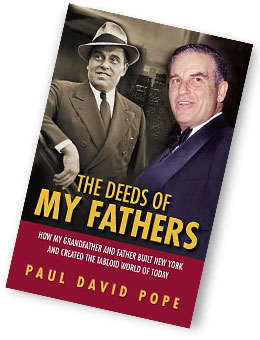FEATURE ARTICLE -
Book Reviews, Issue 48: April 2011
This book could be described in a number of ways. It could be thought of as “Italy comes to New York”, “how big business is conducted in the United States”, or “an introspective into two generations of a disjointed family”.
It is a fascinating yarn, the sort of book which every reader will enjoy. It tells the true story of a father and son: through the eyes of a grandson. The father was Generoso Pope Senior, an Italian penniless immigrant to New York, who rose to prominence in the building and later the newspaper industry, became a king maker for those seeking political office, was a close friend of several Presidents and a serial womaniser.
His son, about whom you will shortly hear more, was generally known as Gene.
Despite his successful business life, Generoso never forgot where he had come from. He sent large sums of money and goods to his family village in Italy where he was lionised, being treated with parades each time he returned and where, to this day, there is a plaque in his memory.
Prior to WW 11, he became a close friend of Mussolini, a friendship which nearly caused the failure of his burgeoning Italian language newspaper business, when public opinion turned against the Fascist regime. He continued to use his newspaper to assist the Italian war effort, until Mussolini broke his word to Pope as to his intended treatment of Jews. Thereafter, with some persuasion, Generoso changed his tune, publishing more factual and less propaganda news concerning the Italian war mongers.
When Generoso died, his wife and elder children turned on the youngest son Generoso Junior (Gene), who was perceived by them to be too much like his father. Gene appears to have been hated by his mother, who more than once expressed her disappointment at not having aborted him. He was turned out by his siblings and mother with a few dollars to his name. Being his father’s son, he knew who to approach for funds to start on his own, turning a losing newspaper (the “Enquirer” later to be re-named “the National Enquirer”) into a prosperous giant in the newspaper industry. To finance this, he, like his father before him, shamelessly used his Italian contacts to borrow money and, I suspect, to achieve through the back door, what he could not obtain through the front door.
Who else could have paid a Presley relative to obtain photos of Elvis, lying in state in his coffin? Who else met his reporters on their return from obtaining scoops, with the question: “You sure you spent enough?” whilst unceremoniously sacking anyone in whom he lost confidence, be their crime as little as a typographical error?
Who else could have gained so much pleasure by spending hundreds of thousands of dollars on the largest Christmas tree, each year, requiring that each successive one was bigger than the last?
One would have hoped that Gene would have learned not to follow his father‘s examples of infidelity, buying favours, disregard for the law and showing little affection for his children. Regrettably, the older the son grew, the more like his father he became.
Whilst he avoided being labelled as a member of the mob, some of his closest friends and supporters were imprisoned, such that he developed an “arm’s length” approach to them to avoid being soiled by imputation.
Like his father who refused to consult doctors, preferring to diagnose himself, Gene became more and more eccentric, reclusive, erratic and isolated, even to the extent of moving his newspaper operation from New York to Florida and building a self-designed house for his family, close by.
To descend into a personal anecdote, I was in Chicago to negotiate a company’s sale. On previous visits I had been unable to get beyond the door of a particular manufacturing plant, for whose Australian representatives, I had acted for 20 years. Whilst driving with a prospective purchaser, we happened to pass by that very plant which prompted me to mention my inability to get inside. Hearing that, he directed his driver to stop, saying that getting inside was no problem as he owned the building. What I could not achieve via the front door, with its massive security etc., was overcome by entering through a side door, straight into the manufacturing area.
I was never in doubt that this Italian American was mafia. Being with him, presented a better recommendation than a letter of introduction from the CEO of the Australian arm of the company. Reading this book brought this memory back, very vividly.
The story of the Popes, through the eyes of the grandson and son, respectively, reveals a sad history of success in business coupled with failure in personal relationships, such that one is left wondering how much, if anything, of lasting value they achieved with their lives? It is hard to imagine that either father or son, were happy people.
This book is gripping, powerful and highly entertaining. It provides a different window into the America of the 1930’s through to the late 1980’s.
If you thought the mob had lost its influence with the gaoling of Al Capone, this book will disabuse you in an instant.
Anyone who thinks that Rupert Murdoch is the most influential newspaper publisher of the 20th Century might also like to take a second look, after seeing what the Popes achieved.



